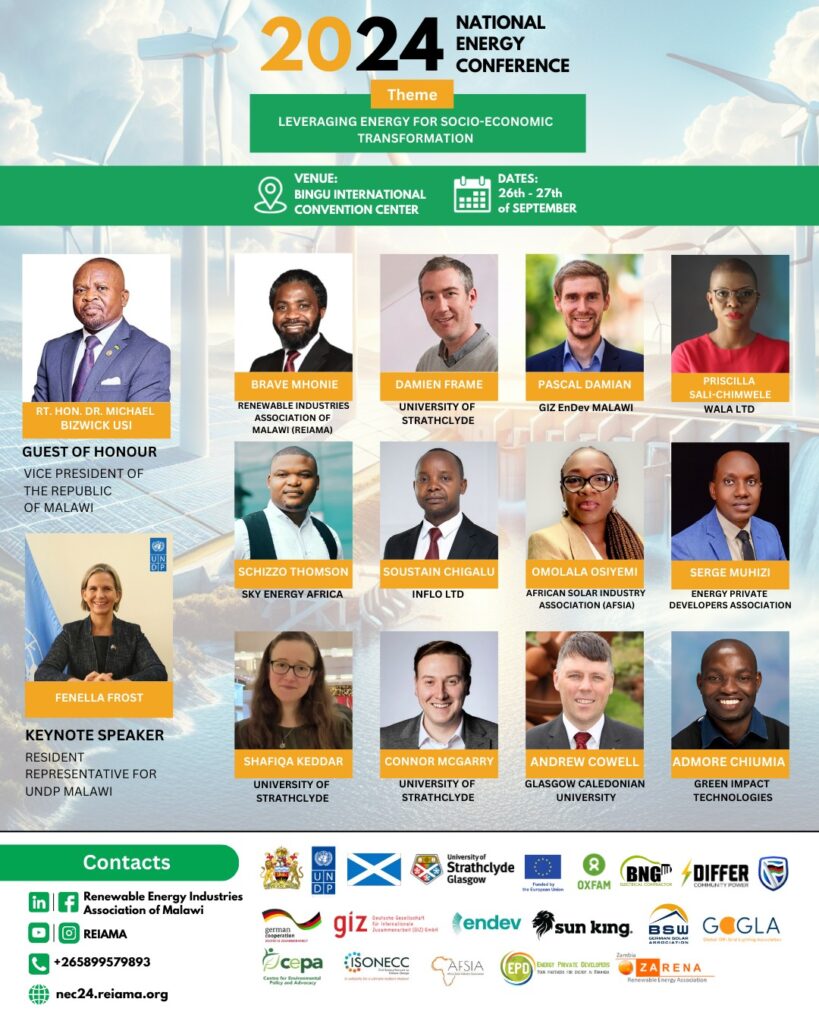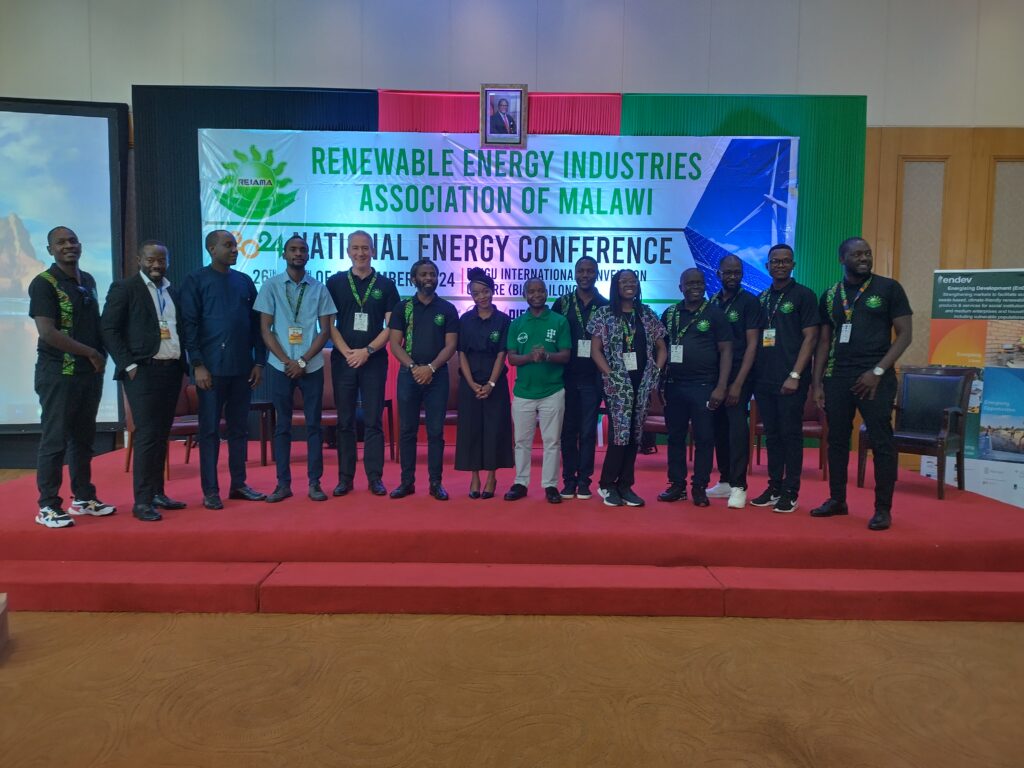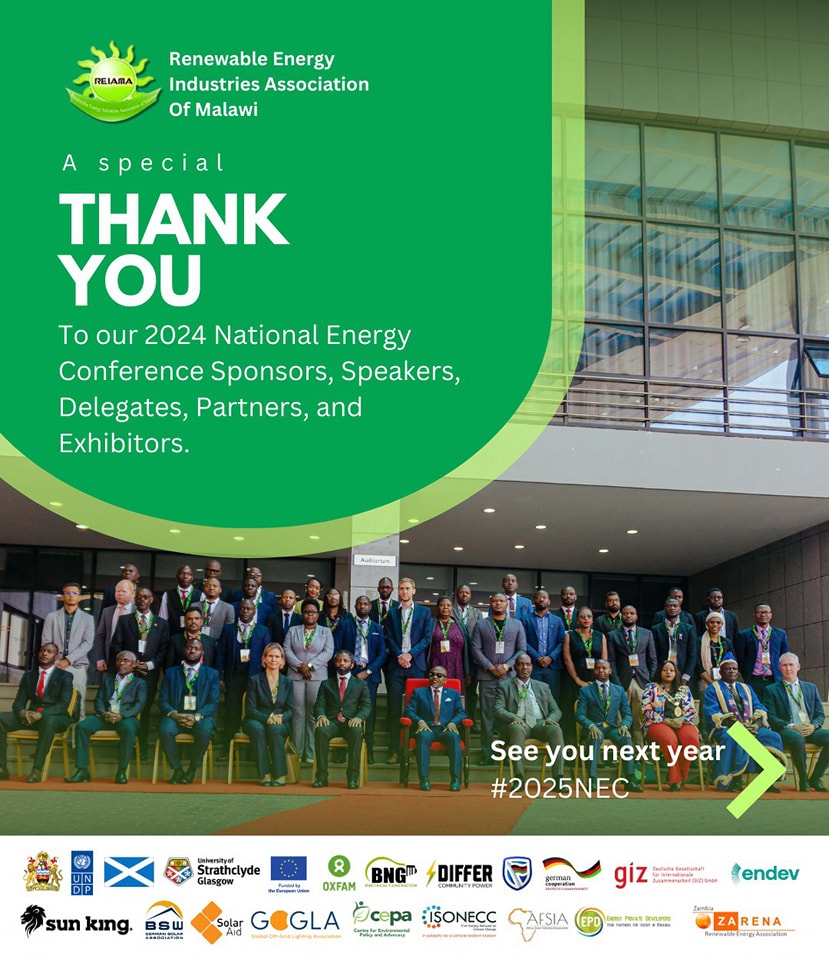Malawi’s 2024 National Energy Conference (NEC) was held from 26th – 27th September 2024 at the Bingu International Convention Centre in Lilongwe, Malawi. The conference brought together 220 delegates, including policymakers, international experts, civil society organizations, and private sector players around the theme Leveraging Energy for Socio-economic Transformation.
This was the first NEC held under the new Global Renewables Centre partnership, following our initial set of knowledge exchange workshop in early 2024. In addition to offering co-financing to underpin the event, the NEC provided an opportunity for the GRC to mobilise contributions from Scotland, Zambia and Rwanda, and to build the network and profile of the GRC.
Highlights included:
- Sharing experiences from Scotland’s community energy sector
- The transferability of geospatial modelling techniques used for low-carbon transition planning to rural electrification and energy access planning
- LV distribution network modelling – suggested practices for developing countries
- Harnessing solar and wind power to provide sustainable energy access in rural Kenya
- Capacity Building Opportunities in Renewables Sector – the THREE-Lanka case study
Conference outputs produced by REIAMA include the Rapporteur’s Report, the final Communique, and a Pictorial – all providing an overview of key contributions, discussions and recommendations.
From a GRC perspective, the recommendations of the conference provide an anchor for ongoing work of developing our knowledge exchange programmes and identifying areas for collaboration.

Recommendation1: Strengthening Partnerships
Public-Private Partnerships (PPPs): Foster collaboration between government entities, private sector players, and non-governmental organizations to leverage resources and expertise. Establishing clear roles and responsibilities within these partnerships can enhance project execution and ensure accountability.
International Collaboration: Engage with international development agencies and organizations to facilitate knowledge transfer and access to innovative technologies that can enhance Malawi’s energy sector.
GRC Comment: An engaged private sector is crucial to scaling up deployment of renewable energy and accelerating electricity access in Malawi. The GRC is committed to enabling the sharing of learning from private sector partnerships via GRC partners in Rwanda, Zambia and Scotland. Success stories from Malawi that can inform the sector include should be properly captured and shared. These include local start-ups delivering high impact energy access projects, NGOs developing social enterprise spin-out companies to build and operate minigrids, and partnerships between academia, NGOs and industry to deliver rural energy access utilising public funding.
Recommendation 2: Policy and Regulatory Frameworks
Streamline Regulatory Processes: Simplify and expedite the approval processes for renewable energy projects to encourage investment. A clear and efficient regulatory framework will reduce the time and cost of project implementation.
Establish Feed-in Tariffs: Introduce feed-in tariffs that guarantee fixed payments for renewable energy producers, thereby providing long-term financial certainty and encouraging investments in solar, wind, and biomass projects.
GRC Comment: A supportive political and regulatory ecosystem is essential to stimulating the sector. Learning can be found in the approaches taken in both Rwanda and Zambia. Zambia currently has a presidential directive to add 1GW of solar generation by the end of 2025 and has slashed project approval timescales from 6 months to 48 hours https://www.moe.gov.zm/?p=4252. In Scotland, Feed-in Tariffs and other renewable energy subsidy schemes have been vital to the roll-out of small and large scale renewables over the last decade, helping Scotland achieve the milestone of generating the equivalent of more than 100% of its electricity demand from renewable sources in 2022.
Recommendation 3: Access to Finance
Create Off-Grid Financing Mechanisms: Develop dedicated funds to support off-grid renewable energy projects, particularly for companies targeting underserved communities. This can help overcome financial barriers and encourage innovation in energy access solutions.
Support for Startups: Facilitate access to funding for startups in the energy sector through grants, low-interest loans, or equity financing. This support can help new companies scale their operations and contribute to job creation.
GRC comment: This topic was prominent in the conference and much debated. We found the analysis presented by Oxfam compelling – clearly identifying the large gap between committed/available funding in government budgets and the spending requirements of 100% electrification. Private sector involvement is essential but requires derisking to attract investors. The recommendation to transform MAREP into a National Electrification Fund that can co-finance decentralized renewable energy systems in rural areas is one way to achieve this.
Recommendation 4: Capacity Building and Training
Workforce Development Programs: Invest in training programs to equip the workforce with the necessary skills to support the renewable energy sector. Collaborate with technical schools and universities to develop curriculum aligned with industry needs.
Community Engagement and Empowerment: Conduct workshops and training sessions in communities to build capacity for project management and maintenance of renewable energy systems. This can lead to greater community ownership and sustainability of energy projects.
GRC Comment: Curriculum alignment should be encourage and supported. Industry sponsored project work and internships have been shown to deliver high value for students and sponsors alike. This is an area of focus for the GRC going forward, drawing experience from, and connecting to initiatives like the international Vertically Integrated Projects consortium.
Recommendation 5: Advancements in Technology
Promote Research and Development (R&D): Encourage investment in R&D for innovative renewable energy technologies suited to Malawi’s specific context. Establish partnerships with universities and research institutions to foster innovation.
Leverage Digital Innovations: Utilize digital tools and artificial intelligence to improve energy management systems, optimize grid performance, and enhance data collection for informed decision-making.
GRC Comment: Academic/Industry collaboration on renewable energy innovation has been a feature of Scotland’s journey to Net Zero. International partnerships involving academics and SME innovators from multiple countries could target specific R&D funds – e.g the Innovate UK Energy Catalyst programme. The GRC also aims to help create new partnerships that can access innovation funding in Scotland.
Recommendation 6: Environmental and Social Considerations
Integrate Environmental Sustainability: Ensure that all renewable energy projects comply with environmental sustainability standards. Conduct environmental impact assessments (EIAs) to mitigate adverse effects on local ecosystems.
Address Social Equity: Prioritize projects that benefit marginalized communities and ensure equitable access to energy services. Engage local stakeholders in decision-making processes to ensure that their needs and concerns are addressed.
GRC Comment: Social and environmental benefits can be integrated into renewable energy scale-up programmes. For example, in Scotland, community benefit funds from renewable energy projects are voluntary initiatives by renewable energy companies to support local communities. These funds are designed to help communities realize their aspirations and address local needs over the lifetime of the renewable energy project. Global citizenship is a key them of the GRC – with an initial focus on promoting solidarity and knowledge sharing between the community energy sectors of our partner countries.
Recommendation 7: Advocacy for Renewable Energy
Promote Awareness Campaigns: Launch awareness campaigns to educate the public on the benefits of renewable energy, energy conservation, and the importance of climate action. Mobilize communities to engage in advocacy efforts for policies that support sustainable energy solutions.
Support for Youth Initiatives: Encourage youth participation in renewable energy projects and advocacy initiatives. Provide platforms for young leaders to share their perspectives and innovative ideas for energy access and sustainability.
GRC Comment: Capturing learning and disseminating widely through a range of channels will remain a core activity for the GRC, helping our local partners with awareness campaigns will be a part of that. Encouraging youth participation is another key aspect of our Global Citizenship approach – reaching out to students through new and existing programmes to engage and connect with peers in other countries. Building on the Vertically Integrated Projects model at Strathclyde University we aim to develop formal international student research collaborations.

